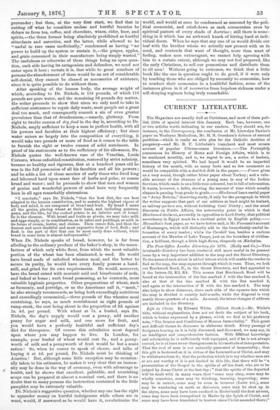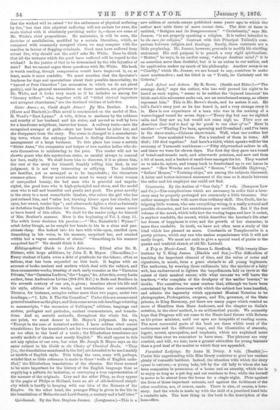Life in Christ. By Edward White. (Elliott Stock.)—Mr. White's title,
without explanations, does not set forth the subject of his book, which is better expressed by a phrase, which we find in his prefatory note, "The Source and Conditions of Human Immortality." This great and difficult theme he discusses in elaborate detail. Every passage of Scripture bearing on it is fully discussed, and discts5ed, we may say, in an intelligent and comprehensive fashion. With Biblical knowledge and scholarship he is sufficiently well equipped, and if he is not always correct, he is at least never disengenuous in his methods of interpretation. That the soul of man is not naturally possessed of immortality ; that this gift is bestowed on it in virtue of the Incarnation of Christ, and may be withdrawn from it; that the probation which is to try whether men are or are not worthy of it is not limited to this life, that there will be "a presentation of the Gospel to the spirits of all the dead, who are to be judged by Jesus Christ at the last day ; " that the spirits of the departed will be dealt with in many ways, that "some may sleep, some may be wholly conscious, some may bo thinking, learning, improving; some
may be in sorrow, some may be even in torment (Luke xvi.), some
may be wandering on earth as damonia, some may be shut up in the abyss, some may have been confined in Hades until the first advent,
some may have been evangelised in Hades by the Spirit of Christ, and some may have been translated to heaven since Christ ascended there ;" that the wicked will be raised "for the endurance of physical suffering by fire," but that this physical suffering will not endure for ever, the seals visited with it absolutely perishing under it,—these are some of Mr. White's chief propositions. He maintains, it will be seen, the doctrine of annihilation, modified by a certain literalism, which, as compared with commonly accepted views, we may compare with the reaction in favour of flogging criminals. Good men have suffered from actual fire, why should not the evil ? asks Mr. White. Does he think that all the tortures which the good have suffered will be repaid to the wicked? Is the justice of God to be determined by the vile injustice of men? But we cannot argue these questions with Mr. White. His book is worth reading, though compression would have improved it, or, at least, made it more readable. We must mention that the Spectator's fondness for dogs and speculations about their possible immortality, its hatred of Free Churches" (an accusation to which we do not plead guilty), and its general unsoundness on these matters, are grievous to Mr. White, and it looks very much as if he includes us among the "literary triflers" who, together with all "titled clerical impostors and arrogant churchmen," are the destined victims of hell-fire.



































 Previous page
Previous page